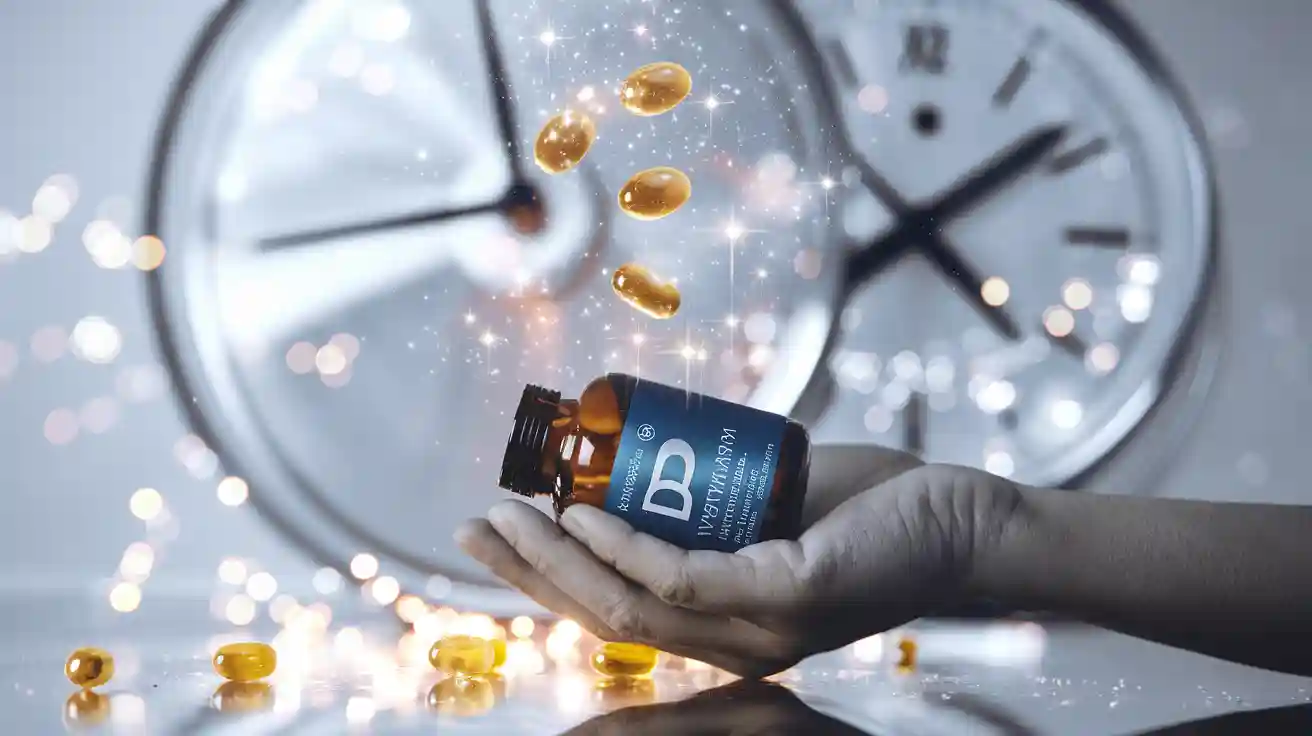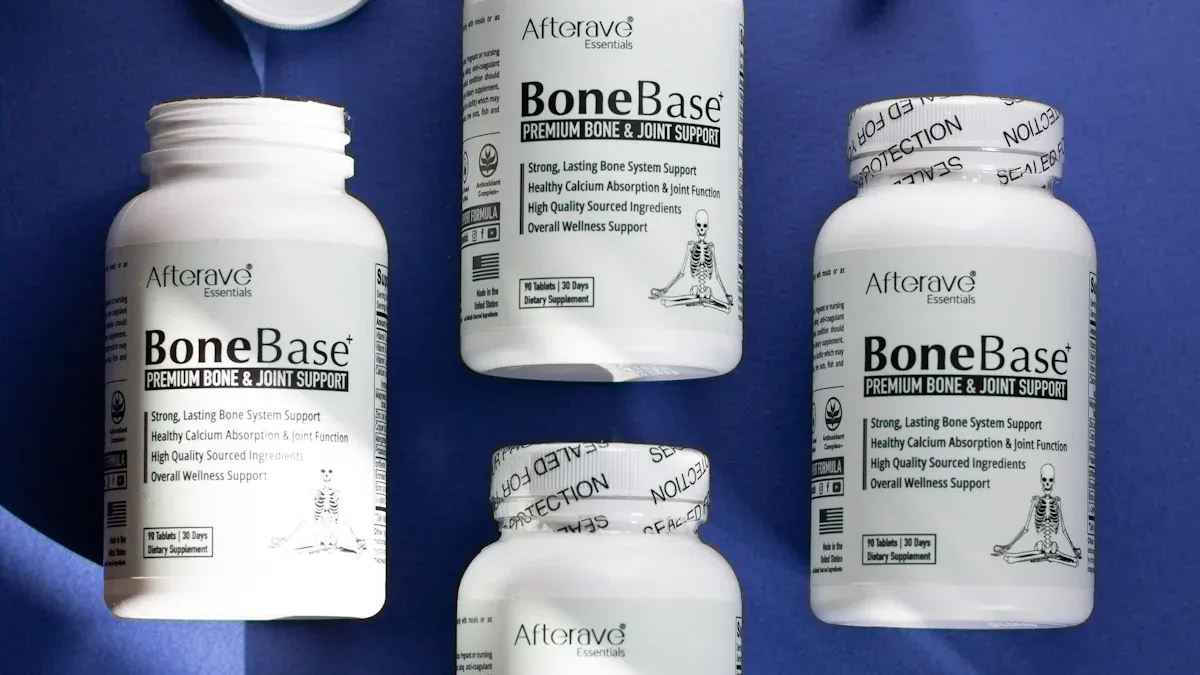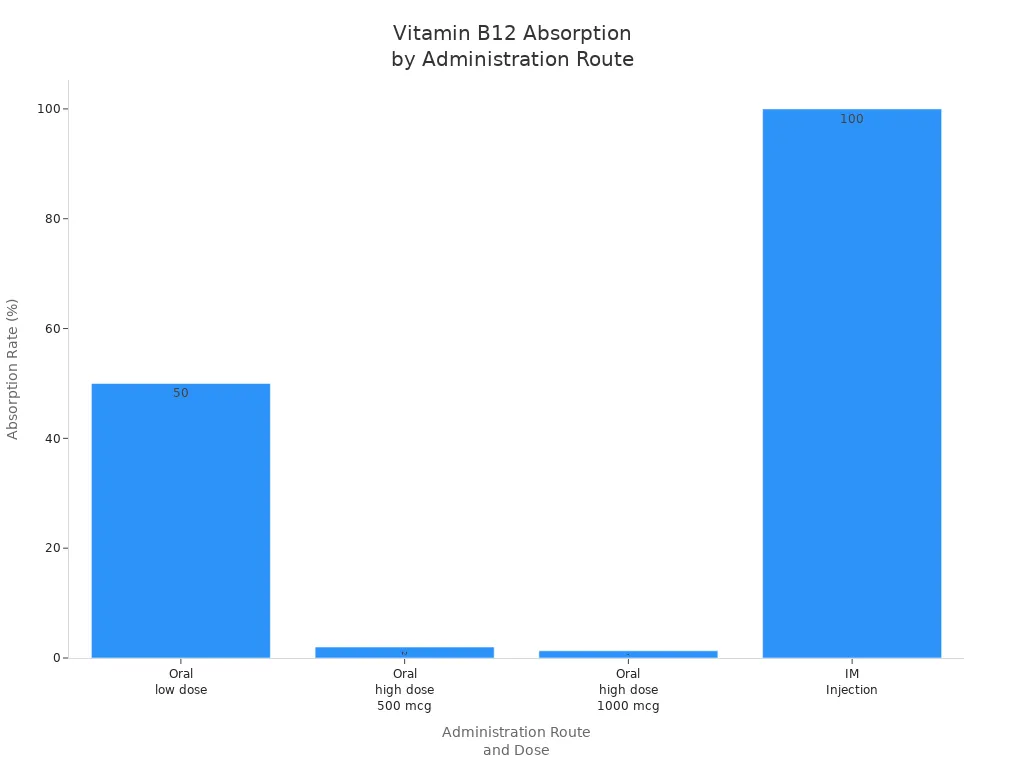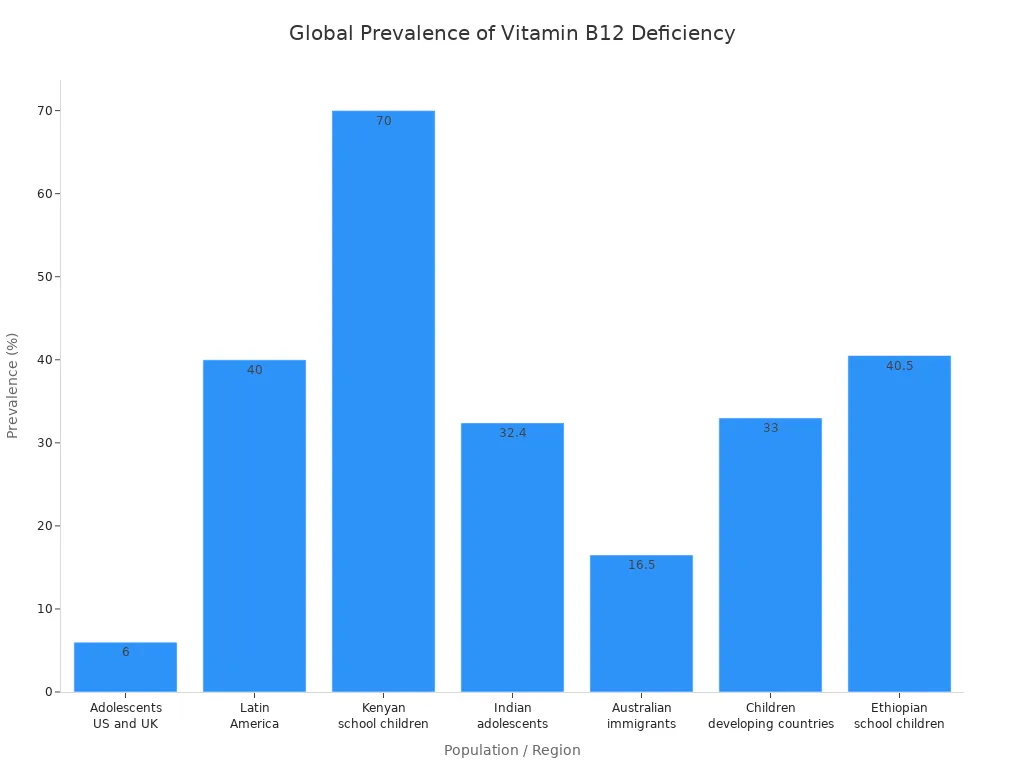How Long Until B Vitamins Start Showing Results
Table of Contents

You might feel some effects from b vitamins within 24 hours, while others notice changes after a few days. Most people see real results from b vitamins in about 1 to 4 weeks. Because b vitamins are water soluble vitamins, your body absorbs them fast. Water-soluble vitamins like b vitamins act quickly, but full benefits can take weeks or even months if you have a deficiency. Everyone reacts differently. Stay consistent and talk to your doctor for the best results.
B Vitamins: What They Are

Types of B Vitamins
You might hear people talk about B vitamins as if they are just one thing, but there are actually eight different types. Each one has a special job in your body. These are all water soluble vitamins, which means your body does not store them for long. You need to get them from food or supplements almost every day. Unlike fat soluble vitamins, which your body can store in fat tissue, water soluble vitamins leave your body through urine if you get too much.
Here’s a quick look at the main types of B vitamins and what they do:
| Vitamin (B number) | Main Roles in Human Health | Key Dietary Sources |
|---|---|---|
| Thiamin (B1) | Breaks down carbs, helps nerves | Whole grains, pork, nuts |
| Riboflavin (B2) | Supports energy, healthy skin | Dairy, eggs, green veggies |
| Niacin (B3) | Turns food into energy, supports nerves | Meat, fish, poultry |
| Pantothenic acid (B5) | Helps make energy, builds fatty acids | Meat, veggies, grains |
| Vitamin B6 | Metabolizes protein, supports brain | Poultry, fish, potatoes |
| Biotin (B7) | Metabolizes fats, proteins, carbs | Eggs, nuts, veggies |
| Folate (B9) | Makes DNA, prevents birth defects | Leafy greens, beans |
| Vitamin B12 | Makes red blood cells, supports nerves | Meat, dairy, eggs |
All these B vitamins work together as a b complex vitamin. They help your body use energy from food and keep your tissues healthy.
Why B Vitamins Matter
You need water soluble vitamins like B for many reasons. They help your body turn food into energy, keep your brain sharp, and support your nerves. If you do not get enough, you might feel tired or weak. Some B vitamins, like B6 and B12, help make red blood cells and keep your nerves working right. Folate is very important during pregnancy because it helps prevent birth defects.
Water soluble vitamins act fast, but you need to take them regularly. Fat soluble vitamins, on the other hand, stay in your body longer. Both types are important, but water soluble vitamins like B need more attention because your body cannot store them.
If you ever wondered, “how do vitamins work?”—think of B vitamins as helpers in almost every part of your body. The benefits of b vitamins include better energy, a healthy heart, and a strong brain. When you get enough B, you help your body stay healthy and feel good every day.
How Long Do Vitamins Take to Work
How Long Does It Take for B Vitamins to Work
You probably want to know, “how long does it take for vitamins to work?” The answer depends on the type of vitamin, your body, and how you take it. When you start taking b, you might notice some effects quickly. Some people feel a boost in energy or mood within 24 hours. Others need a few days or even weeks to see changes. If you have a deficiency, the full benefits can take weeks or months to show up.
Let’s look at a typical timeline for b:
| Time Point | Documented Symptom Improvements |
|---|---|
| Day 1 | You may feel a little more energy or warmth, especially if you had anemia. |
| 30 Days | Your energy levels can become more steady. You might notice better mood and clearer thinking. |
| 60 Days | You could see bigger changes in energy, mood, and even healthier hair, nails, and skin. |
| 90 Days | Most people feel much better overall. Sleep improves, mood balances, and deficiency symptoms fade. |
| 1 Year | You may enjoy long-term benefits like a stronger immune system, better brain function, and steady energy. |
The way you take b also matters. Oral supplements are common and work well for most people. Your body absorbs about 50% of a low dose of oral vitamin B12, but only about 1-2% of a high dose. Injections, on the other hand, give you almost 100% absorption because they go straight into your muscle. Here’s a quick look at the differences:
| Route of Administration | Absorption Rate / Bioavailability | Notes |
|---|---|---|
| Oral Vitamin B12 (low dose <1–2 mcg) | ~50% absorption | Limited by intrinsic factor in your gut |
| Oral Vitamin B12 (high dose, e.g., 1000 mcg) | ~1.3% absorption | High doses help make up for low absorption |
| Intramuscular Injection (IM) | Near 100% | Bypasses your gut, works fast |
| Sublingual Vitamin B12 | Similar to oral | Easy to take, good for those who dislike pills |

Even though injections work faster, high-dose oral supplements can be just as effective over time. Most people do not need injections unless they have trouble absorbing b from food or pills.
If you are not deficient, you might not notice any big changes. Your body uses what it needs and gets rid of the rest. For people with a deficiency, the timeline for improvement depends on how low your levels are. Mild deficiencies often get better in days or weeks. Severe deficiencies can take longer, especially if you have nerve symptoms. Sometimes, nerve damage takes months to heal, and in rare cases, it may not fully reverse.
Factors That Affect How Long It Takes
You might wonder, “what are the factors affecting how fast they work?” Several things can change how long it takes for b to show results:
- Severity of Deficiency: If your b levels are only a little low, you will probably feel better faster. Severe deficiencies take longer to fix. Your body needs time to rebuild its stores, especially if you have had low levels for a long time.
- How You Take It: Oral, sublingual, and injectable forms all work, but injections act faster. Still, high-dose oral supplements can work just as well for most people.
- Your Age and Health: Older adults and people with certain health problems may need more time. Your body’s ability to absorb b can slow down as you age. Health conditions like inflammation or digestive issues can also make a difference.
- Genetics: Some people have genetic differences that affect how their bodies use b. For example, if you have a certain MTHFR gene type, you may need more folate or riboflavin to get the same benefits as others. Your genes can change how long it takes for vitamins to work for you.
| Genetic Variant | Effect on Vitamin Metabolism | Impact on Biomarkers | Influence on Supplementation Response | Notes |
|---|---|---|---|---|
| MTHFR C677T (TT) | Reduced enzyme activity | Lower folate, higher homocysteine | Need more folate, slower response | More common in some groups |
| TCN2 776C>G | Changes B12 transport | Alters homocysteine | May change response to B12 | Affects B12 in your blood |
- Diet and Lifestyle: What you eat and how active you are can change how long it takes for vitamins to work. If you eat a balanced diet and stay active, you may see results sooner. Inflammation in your body can slow things down.
- Type of Vitamin: Water-soluble vitamins like b move through your body quickly. Fat soluble vitamins, such as vitamins A, D, E, and K, stay in your body longer and take more time to build up.
Tip: If you want to know how long it takes for vitamins to work, keep a journal. Write down how you feel each day. This can help you notice small changes over time.
Here’s a quick list of factors affecting how fast they work:
- Severity of deficiency
- How you take the vitamin (oral, injection, sublingual)
- Age, gender, and health status
- Genetics
- Diet and lifestyle
- Type of vitamin (water-soluble or fat-soluble)
When you look at the timeframe for common vitamins and supplements, you will see that water-soluble vitamins like b often act faster than fat-soluble vitamins. Fat soluble vitamins need more time to build up in your system. The timeframe for common vitamins and supplements can range from a few days to several months, depending on all these factors.
So, how long does it take? For most people, you will notice some changes in a few days to a few weeks. If you have a deficiency, it may take longer. If you are healthy and not low in b, you might not feel any different at all. Remember, how do vitamins work? They help your body run smoothly, but you need to give them time and take them regularly.
B Vitamin Deficiency: Signs and Recovery

Symptoms of B Vitamin Deficiency
You might wonder how you can spot a b vitamin deficiency. Your body gives you clues when it needs more b. Some signs of vitamin b deficiency show up as tiredness, skin changes, or even trouble thinking clearly. If you feel weak, get headaches often, or notice your skin looks pale, you could be missing b. Sometimes, you get numbness or tingling in your hands and feet. Mouth ulcers and muscle weakness are also common signs of vitamin b deficiency.
Here’s a table that shows the most common symptoms for different types of b vitamin deficiency:
| B Vitamin Deficient | Common Signs and Symptoms |
|---|---|
| General B Vitamin Deficiency | Fatigue, skin rash, confusion, muscle weakness, nausea, anemia-related symptoms, skin changes |
| Vitamin B12 Deficiency | Fatigue, weakness, loss of appetite, headache, skin paleness, heart palpitations, weight loss, mouth ulcers, numbness and tingling, shortness of breath, vision problems, irritability, cognitive changes |
| Vitamin B9 (Folate) Deficiency | Megaloblastic anemia, fatigue, trouble concentrating, irritability, headache, heart palpitations, shortness of breath, mouth sores, changes in skin, hair, or fingernail color |
Tip: If you notice these signs of vitamin b deficiency, talk to your doctor. Early action helps you recover faster.
B vitamin deficiency is more common than you might think. In some places, many kids and adults do not get enough b. Take a look at this chart to see how b vitamin deficiency rates change around the world:

Recovery Timeline
When you start taking b supplements, you want to know how long it takes to feel better. The recovery timeline depends on how low your b levels are and how quickly you get treatment. Mild b vitamin deficiency usually gets better in a few weeks. You might notice more energy and clearer thinking after just a few days. If your deficiency is moderate, it can take three to nine months to feel fully recovered. Severe b vitamin deficiency, especially with nerve problems, may need a year or more for full recovery.
Here’s a simple table to show how long recovery can take:
| Severity of B12 Deficiency | Recovery Timeline | Notes |
|---|---|---|
| Mild | A few weeks to 3-6 months | Energy and mood improve quickly; full recovery in months |
| Moderate | 3 to 9 months | Anemia or mild nerve damage; big improvements in months, full recovery up to 9 months |
| Severe | Up to 1 year or more | Nerve damage or long-term anemia; slow recovery, sometimes not complete |
Note: The faster you catch b vitamin deficiency, the quicker you bounce back. Severe cases can cause nerve damage that may not fully heal.
Recovery also depends on your age, health, and how you take b. Injections and high-dose supplements work faster for some people. If you have digestive problems, recovery might take longer. Kids and older adults in developing countries often need more time because their bodies have less b to start with.
If you keep taking b and eat healthy foods, you help your body heal. Stay patient and track your progress. Most people feel better step by step.
Signs B Vitamins Are Working
Energy and Mood Changes
You might wonder, how do you know if vitamins are working? One of the first things you may notice is a change in your energy. Many people say they feel the difference in just a few days or weeks. You might wake up feeling less tired or find it easier to get through your day. Some studies show that certain types of b can help lower feelings of fatigue, especially after exercise or long days at school.
Here’s a quick look at how different b vitamins can boost your energy:
| Vitamin (B type) | Who Took It | Dose & Duration | Change in Energy/Fatigue |
|---|---|---|---|
| Thiamine (B1) | Young athletes | 100 mg/day for 3 days | Less tired after exercise |
| Riboflavin (B2) | Young women | 2 or 4 mg daily for 8 weeks | Better blood health, more energy |
| Riboflavin (B2) | Ultramarathon runners | 100 mg before and during race | Less muscle pain, better performance |
| Folate (B9) | Children | 1 mg/day for 3 months | Less tired, more active |
Mood changes can also be a sign that your b vitamins are working. You may feel less stressed or notice your mood lifting. Clinical trials show that people who take b for several weeks often report less stress and better mood. Some scientists think this happens because b helps your brain work better and lowers certain chemicals that can make you feel down.
If you start to feel calmer or happier after taking b, you are not alone. Many people notice these changes after a few weeks.
Physical Health Improvements
Physical changes are another way to answer the question, how do you know if vitamins are working? You might see improvements in your hair, skin, or nails. Your body may feel stronger, and you could get sick less often. Here are some common physical benefits you might notice:
- More steady energy throughout the day
- Healthier hair and skin
- Fewer headaches or migraines
- Better digestion
- Less tingling or numbness in your hands and feet
- Stronger immune system
Regular b intake helps your body turn food into energy, keeps your nerves healthy, and supports your heart. Some people even notice fewer muscle aches or better vision. If you are pregnant, b vitamins help your baby grow strong and healthy.
You may not notice every change right away, but small improvements add up. Keep track of how you feel each week. Over time, you will see how b makes a real difference in your daily life.
How to Maximize Results
Consistency and Dosage
If you want to get the most out of your B vitamins, you need to take them every day. Skipping doses slows down your progress. Studies show that people who take folic acid and vitamin B12 daily for months see big improvements in memory and thinking. You might notice more energy and better mood after just a few weeks of steady use, especially if you have a deficiency.
Choosing the right dose matters, too. Most people do well with the recommended daily allowance (RDA), but some experts suggest higher doses for certain needs. Here’s a table to help you see what’s safe and effective:
| Vitamin | RDA | Common Supplement Dose | Safety Notes |
|---|---|---|---|
| B-1 (Thiamin) | 1.4 mg | 15–50 mg | No known problems at higher doses |
| B-2 (Riboflavin) | 1.1–1.3 mg | 10–50 mg | High doses may cause itching or dark urine |
| B-3 (Niacin) | 14–16 mg | 20–150 mg | Over 50 mg may cause flushing; ask your doctor |
| B-5 (Pantothenic Acid) | 4–7 mg | 5–10 mg | Large doses may cause diarrhea |
| B-6 (Pyridoxine) | 1.5–1.7 mg | 25–100 mg | Over 100 mg long-term may cause nerve damage |
| B-7 (Biotin) | 35–60 mcg | 100–400 mcg | Well tolerated |
| B-9 (Folate) | Varies | Use caution | High doses can hide B12 deficiency |
| B-12 | Varies | No upper limit | Rare side effects at very high doses |
Tip: More is not always better. Too much B can cause problems like nerve damage, digestive issues, or even heart trouble. Stick to safe doses and talk to your doctor if you want to go higher.
Diet and Lifestyle
You can boost your B vitamin levels by eating the right foods. Whole grains, seeds, and soy give you thiamine, riboflavin, niacin, and B6. Meat, especially organ meats like liver, packs a punch with B12, B6, and folate. Dairy, fish, eggs, and green veggies also help you meet your needs. Fortified cereals make it easy to get several B vitamins at once.
Here are some top foods for B vitamins:
- Salmon: Loaded with B12, B3, and B6.
- Eggs: Rich in B12, B2, and B5.
- Beef liver: Super high in B12, B6, biotin, and folate.
- Lentils: Great source of folate.
- Sunflower seeds: Packed with B6 and other B vitamins.
- Spinach: Full of B2, B6, and folate.
Your lifestyle affects how well your body uses B vitamins. Drinking alcohol lowers your B vitamin levels and raises homocysteine, which is bad for your heart. Beer might boost B6 but can drop B12. Spirits and wine cut down folate and B12. If you drink often, you need to pay extra attention to your diet.
Note: Staying active helps your body use and get rid of extra vitamins. If you sit a lot or sweat less, you might hold on to more B vitamins, which can lead to problems if you take too much.
Eating well, moving your body, and keeping alcohol in check help you get the best results from your B vitamins.
You might notice changes from B vitamins in just a few days, but most people see real results in one to four weeks. Full benefits, especially if you have a deficiency, can take longer. Staying consistent and checking in with your doctor helps you get the best outcome. Regular monitoring lets you catch low levels early, which protects your brain and keeps you feeling your best. Track your progress, stay patient, and remember that small steps add up over time.
FAQ
How can you tell if B vitamins are working?
You might feel more energy, better mood, or clearer thinking. Sometimes your skin, hair, or nails look healthier. Keep a journal to track small changes. If you feel better after a few weeks, your B vitamins are likely helping.
Can you take B vitamins on an empty stomach?
Yes, you can take most B vitamins with or without food. Some people feel less stomach upset if they eat first. If you feel sick after taking them, try having a small snack.
Is it safe to take B vitamins every day?
For most people, daily B vitamins are safe. Your body gets rid of extra amounts in urine. Too much can cause problems, so stick to the recommended dose. Always check with your doctor if you have health concerns.
What happens if you miss a dose?
Don’t worry if you miss a dose. Just take your next one as usual. You won’t lose all your progress. Staying consistent helps you see the best results, so try to remember your vitamins each day.

Poseidon
Master of Nutritional Epidemiology, University of Copenhagen, Herbal Functional Nutrition Researcher
Focus: The scientific application of natural active ingredients such as Tongo Ali, Horny Goat Weed, and Maca to sexual health and metabolic regulation.
Core Focus:
Men: Use a combination of Tongo Ali (an energizing factor) + Maca (an energy reserve) to improve low energy and fluctuating libido.
Women: Use a combination of Horny Goat Weed (a gentle regulator) + Maca (a nutritional synergist) to alleviate low libido and hormonal imbalances.
Stressed/Middle-Aged Adults: This triple-ingredient synergy supports metabolism, physical strength, and intimacy.
Product Concept:
Based on traditional applications and modern research (e.g., Tongo Ali promotes testosterone-enhancing enzyme activity, and icariin provides gentle regulation), we preserve core active ingredients and eschew conceptual packaging—using natural ingredients to address specific needs.
Simply put: I'm a nutritionist who understands "herbal actives." I use scientifically proven ingredients like Tongo Ali, Epimedium, and Maca to help you make "sexual health" and "nutritional support" a daily routine.
